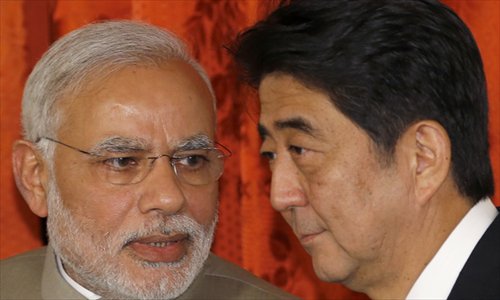Modi-Abe intimacy brings scant comfort

Indian Prime Minister Narendra Modi (left) chats with Japanese Prime Minister Shinzo Abe during a signing ceremony at Akasaka State Guest House in Tokyo on Monday. Photo: AFP
During his ongoing state visit to Japan, Indian Prime Minister Narendra Modi made some remarks on Monday that could easily be highlighted and hyped up by media outlets. As an example, he said that Japan and India should strengthen strategic cooperation to promote peace and prosperity in Asia and meanwhile counter an expansionist mind-set.
"Everywhere around us, we see an 18th century expansionist mind-set: encroaching on another country, intruding in others' waters, invading other countries and capturing territory," Modi said in a speech to business leaders in Tokyo.
Japanese and Western public opinion views his remarks as a clear reference to China, although he did not mention China by name.
This interpretation made some sense because Modi is more intimate to Tokyo emotionally. Therefore it is perhaps a fact that he embraces some nationalist sentiments against China.
But the rationality, policy and strategy of a big country are shaped by its national interests. As a defender of India's national interests, Modi is predicted to make some remarks suitable for media hype, but he has avoided naming China directly.
China's GDP is five times that of India's. Mutual trust between Beijing and New Delhi, facing strategic pressure from the north, is difficult to build as there is also an unresolved border conflict between the two.
But India has proved it is a rational country, displaying an independent foreign policy and loathing being an appendix of any particular power. Plus, India cherishes peace. The consensus between China and India has become stronger over not letting border issues shadow a bilateral relationship. The positive India-China relationship has also created conditions for rapport between India and Pakistan.
The increasing intimacy between Tokyo and New Delhi will bring at most psychological comfort to the two countries. What is involved in China-India relations denotes much more than the display of the blossoming personal friendship between Modi and Abe. After all, Japan is located far from India. Abe's harangue on the Indo-Pacific concept makes Indians comfortable. It is South Asia where New Delhi has to make its presence felt. However, China is a neighbor it can't move away from. Sino-Indian ties can in no way be counterbalanced by the Japan-India friendship.
Both as new emerging countries and members of BRICS, China and India have plenty of interests in common. Geopolitical competition is not the most important thing for the two countries, at least at present.
China-India relations are stable. Chinese President Xi Jinping will pay a state visit to India later this month and the only country Chinese leaders won't visit in the near future is Japan. If Japan attempts to form a united front centered on India, it will be a crazy fantasy generated by Tokyo's anxiety of facing a rising Beijing.
Related reports:
Japan, India agree to boost ties, fast-track defense talks
Modi knows China relations more important in long run
Mutual great power ambitions bring India and Japan together